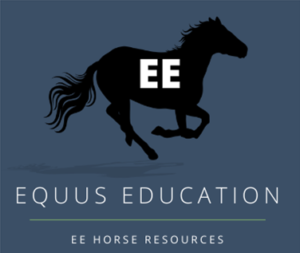But still horse-related – obviously! One has discovered today, perhaps my calling is in rugs – fixing them, that is. Not really, but I was rapt to find that I could fix my own problem! I was rather annoyed to find earlier in the week when bringing my gelding in for a feed that his rug had a hole in the body of it, no doubt from where one of the other boys in the paddock had taken a nip at my boy and consequently ended up with a mouthful of rug that was obviously in need of ripping!
I bought the rug off eBay early last year after being told by the owner of the riding school where I keep Pride at that she got her new rugs from an Axiom supplier – the rugs were reasonably priced and some ridiculously cheap if the interest was low at time of sale and the provider posts out promptly after payment for the item at the end of the sale.
 I’ve been rapt with the blue/silver combo that I got and it fits Pride well, not rubbing at all or restricting movement and it keeps him lovely and dry and of course, clean! So, rather than purchasing a new rug (it was ripped to the point that if it got rained on, I’d have a rather damp horse and the inside stuffing would be ruined) I wanted to see if I could patch it up in some way at a low cost.
I’ve been rapt with the blue/silver combo that I got and it fits Pride well, not rubbing at all or restricting movement and it keeps him lovely and dry and of course, clean! So, rather than purchasing a new rug (it was ripped to the point that if it got rained on, I’d have a rather damp horse and the inside stuffing would be ruined) I wanted to see if I could patch it up in some way at a low cost.
So I rang the older sister (who happens to work in fashion and is very up to date on types of material) to see if she had any ideas. Generally I wanted to be able to join the tears together or put a cover of fabric over the top and have it sealed and waterproof. She suggested a product called Vliesofix. Vliesofix, a “double sided adhesive web that is paper backed for easy application. When ironed Vliesofix joins two fabrics together permanently. This means that applique work can be completed quickly and simply and always look perfect.”
She did mention that the catch was that it needed to be ironed on and ironing onto a water proof fabric could highly probably melt the fabric. To try and stop this from happening, she suggested ironing the material to the Vliesofix, peeling back the paper from the adhesive material, placing this over the rug where I wanted it to be joined and then placing a tea towel over the area to be ironed and ironing over the tea towel.
When purchasing the Vliesofix and material at the store, the woman informed me she had no waterproof material (I think I’ve solved this problem by finding a spray on substance that repels water) and she wasn’t convinced that I could get away with joining the material to a waterproof rug due to the hot iron melting it. I am rapt to say that the tea towel idea seems to have worked, as the new material is now covering where the rip is and I sprayed the waterproofing agent on the rug this afternoon a few hours before putting it on my boy. The test will be tomorrow when I head out there to see if the new piece of material is indeed still part of the rug! Fingers crossed.
It’s just counting strides, finding your distance, swapping leads, and looking good doing it. Relax, what could be easier?
tag: horse rugs, Axiom, rug repairs
 Last week I purchased the British Horse Society Complete Manual of Stable Management online. When the book arrived in the post, some advertising for the publishing company came with it and I thought I may as well check out their website:
Last week I purchased the British Horse Society Complete Manual of Stable Management online. When the book arrived in the post, some advertising for the publishing company came with it and I thought I may as well check out their website:  There seems to be reasonable money in taking in client’s horses, keeping them at your facility and rugging, mucking out boxes, feeding, grooming and exercising the animals and then having staff parade them at sales and take them through the ring.
There seems to be reasonable money in taking in client’s horses, keeping them at your facility and rugging, mucking out boxes, feeding, grooming and exercising the animals and then having staff parade them at sales and take them through the ring.


